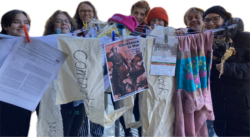Finding a Space for Joy
In the previous blog post, the team introduced our project “Ways of Knowing: Developing Research Cultures of Resistance” and shared some reflections on the challenges of creating a genuinely collaborative and interdisciplinary team. In this post, the team considers the benefits and importance of creating this kind of research culture. This project is funded by Research England’s Enhancing Research Culture (ERC) fund, as part of the University's ERC Open Call 2023-24.

Our aim for this project was to see if using creative techniques could make it easier to collaborate across disciplinary boundaries. Research culture can be very isolating, competitive rather than collaborative. We wanted to see if there was a better way of doing research that encouraged cooperation, intellectual generosity, and mutual support. Could working with creative partners help to break down barriers of nationality, language and methodology, challenge some of our research assumptions and disrupt academic hierarchies? Ultimately, our aim was to understand what lies at the heart of a good research network.
The theme of our second workshop was “Protest and Activism” and key questions emerged from our discussions such as
- How do we define protest?
- What is the price of activism?
- What is the relationship between the academic researcher, activists (whether contemporary or historical), and academics as activists?
Much of the research we discussed is connected to trauma and difficult subject matter and we discussed the challenges of working in this field. We recognised that it is a liberating experience to not deny feelings that might be provoked through this research; both putting the human back into the humanities and seeing the social sciences as an intervention in social practice are important here.
Through the creative aspects of this workshop, we were able to make a space for joy, and, as creative practitioner Wiebke put it, “meet as humans rather than as academics”. It is common in many academic fields to acknowledge the researcher’s positionality or subjectivity but here the purpose was to embrace this humanity, in all its messiness and find the joy of connecting with each other as people and as researchers.
We also accomplished this in a co-writing activity. Filmmaker Charlotte set us a co-writing challenge. She wanted us to work together to produce a narrative voice-over that would 'tell the story of the film' more coherently. We had planned to write this text in advance but the demands of academic life and the difficulties of imagining what we collectively wanted to say in isolation proved to be too difficult.
With the deadline for recording looming, we produced the final text in an intense collaborative writing session. We had the outline of the text but needed to find our collective voice as well as giving space for our individual responses. Short bursts of speedwriting were interspersed with longer discussions of what each of us had written about our methodologies and understanding of cooperation in their research. In this way, a text emerged that truly represented the group. Co-writing is less common in many humanities subjects and requires a great deal of trust in the co-creators. By this stage in the project, that trust had been established through our shared activities and experiences.
We are now looking forward to seeing the first edit of the film, which will make visible how cooperation and connection generate new ways of knowing. We are planning a film screening for a wider audience.
The project team consists of:
- Wiebke Acton (University of Leeds)
- Louise Earnshaw (University of Leeds)
- Maša Mrovlje (University of Leeds)
- Corinne Painter (University of Leeds)
- Ingrid Sharp (University of Leeds)
- Judit Acsády (HUN-REN Centre for Social Sciences)
- Charlotte Bill (Clapham Film Unit)
- Nicole Bögelein (University of Cologne)
- Mary McAuliffe (University College Dublin)
